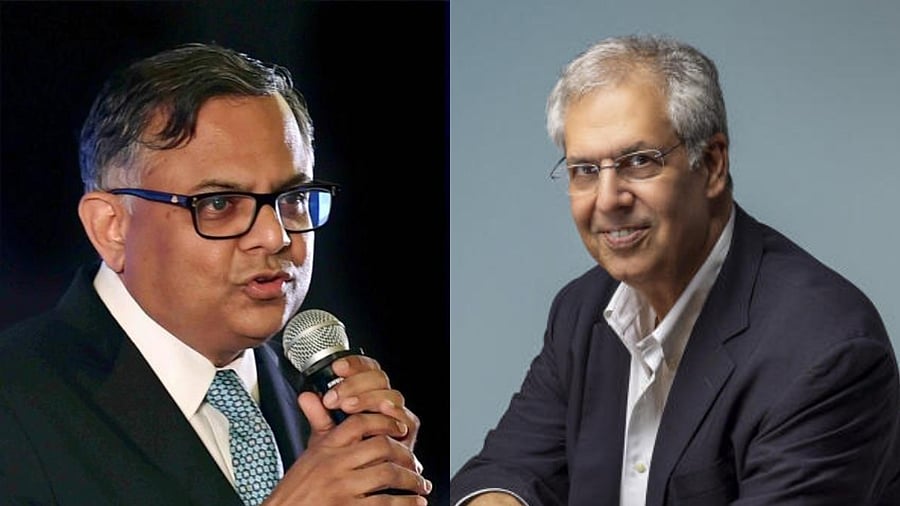
Tata Sons chairman N Chandrasekaran (L) & Tata Trusts chairman Noel Tata.
Credit: PTI Photos
The Tata Group, India’s most valuable and revered conglomerate, is facing an unusual crisis. A bitter dispute has erupted within Tata Trusts, the charitable umbrella that holds a decisive 66% stake in Tata Sons, the group’s holding company.
The infighting threatens not just the appointment of board directors, but the very governance of a 180 billion dollars empire that spans over 400 companies, including 30 listed firms, and touches nearly every sector of the Indian economy.
At the heart of the conflict are two factions of Tata Trusts trustees. On one side is Noel Tata, appointed chairman after the death of Ratan Tata in October 2024, along with a small group of allies who emphasise transparency and adherence to the group’s ethical values.
On the other side is Mehli Mistry, whose ties with the extended Shapoorji Pallonji family, the second-largest shareholder in Tata Sons, have fueled speculation that he seeks greater influence over board appointments. Sources say Mistry feels sidelined on key decisions, creating a vertical split within the Trusts’ seven-member board.
The flashpoint came on September 11, when six trustees convened to discuss the reappointment of Vijay Singh, a 77-year-old former defence secretary and long-serving director at Tata Sons.
The proposal, supported by Noel Tata and Venu Srinivasan, chairman emeritus of the TVS Group, faced stiff opposition from Mistry’s faction, which led to the resolution being rejected. In a further escalation, the four trustees tried to nominate Mehli Mistry to the Tata Sons board, only to be blocked by Noel Tata and Srinivasan. The resulting standoff prompted Singh to resign voluntarily, leaving a cloud of uncertainty over future board nominations.
The infighting is not just about individual board seats. It highlights deeper questions about governance, succession, and the concentration of power in India’s largest private conglomerate. “The primary question in front of the government, considering how significant and important the Tata Group is to the country’s economy, is whether it can let an individual take control of it,” a source close to the matter told PTI.
The stakes are high enough to warrant government attention. On October 7, Noel Tata and Tata Sons Chairman N Chandrasekaran, along with Venu Srinivasan and trustee Darius Khambata, met Union Home Minister Amit Shah and Finance Minister Nirmala Sitharaman. While the exact details of the discussions remain undisclosed, the meeting is widely interpreted as a move to ensure that Tata Sons’ functioning and by extension, the broader Tata Group, remains unaffected by the internal strife.
The dispute also intersects with regulatory concerns. Tata Sons, classified as a Core Investment Company (CIC), was expected to publicly list by the Reserve Bank of India deadline of September 30. While the company has applied for voluntary surrender of its CIC registration, the RBI is still reviewing the application. For insiders, however, these regulatory issues have taken a backseat to the governance crisis, which they fear could allow disproportionate influence over the group by a select few trustees.
Looking ahead, a Tata Trusts board meeting scheduled for October 10 is expected to be closely watched by shareholders, regulators, and policymakers alike.
